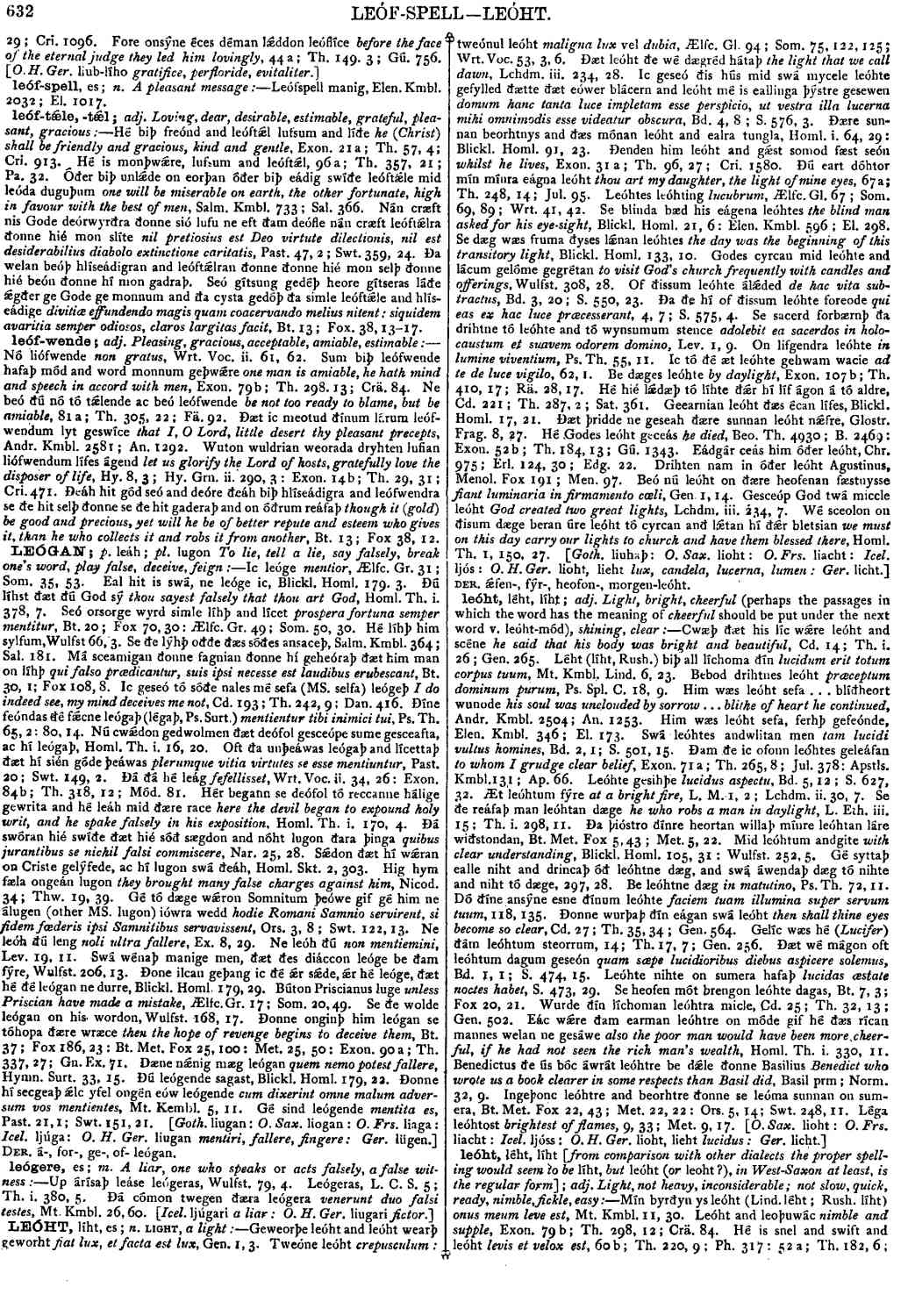LEÓGAN
- verb [ strong ]
-
Ic leóge
mentior,
- Ælfc. Gr. 31 ;
- Som. 35, 53 .
-
Eal hit is swá, ne leóge ic,
- Blickl. Homl. 179. 3 .
-
Ðú líhst ðæt ðú God sý
thou sayest falsely that thou art God,
- Homl. Th. i. 378, 7 .
-
Seó orsorge wyrd simle líhþ and lícet
prospera fortuna semper mentitur,
- Bt. 20 ;
- Fox 70, 30 :
- Ælfc. Gr. 49 ;
- Som. 50, 30 .
-
Hé líhþ him sylfum, Wulfst
- 66, 3.
-
Se ðe lýhþ oððe ðæs sóðes ansaceþ,
- Salm. Kmbl. 364 ;
- Sal. 181 .
-
Má sceamigan ðonne fagnian ðonne hí geheóraþ ðæt him man on líhþ
qui falso prædicantur, suis ipsi necesse est laudibus erubescant,
- Bt. 30, 1 ;
- Fox 108, 8 .
-
Ic geseó tó sóðe nales mé sefa (MS. selfa) leógeþ
I do indeed see, my mind deceives me not,
- Cd. 193 ;
- Th. 242, 9 ;
- Dan. 416 .
-
Ðíne feóndas ðé fǽcne leógaþ (légaþ, Ps. Surt.)
mentientur tibi inimici tui,
- Ps. Th. 65, 2 :
- 80, 14 .
-
Nú cwǽdon gedwolmen ðæt deófol gesceópe sume gesceafta, ac hí leógaþ,
- Homl. Th. i. 16, 20 .
-
Oft ða unþeáwas leógaþ and lícettaþ ðæt hí sién góde þeáwas
plerumque vitia virtues se esse mentiuntur,
- Past. 20 ;
- Swt, 149, 2 ,
-
Ðá ðá hé leág
fefellisset,
- Wrt. Voc. ii. 34, 26 :
- Exon. 84 b ;
- Th, 318, 12 ;
- Mód. 81 .
-
Hér begann se deófol tó reccanne hálige gewrita and hé leáh mid ðære race
here the devil began to expound holy writ, and he spake falsely in his exposition,
- Homl. Th. i. 170, 4 .
-
Ðá swóran hié swíðe ðæt hié sóð sægdon and nóht lugon ðara þinga
quibus jurantibus se nichil falsi commiscere,
- Nar. 25, 28 .
-
Sǽdon ðæt hí wǽran on Criste gelýfede, ac hí lugon swá ðeáh,
- Homl. Skt. 2, 303 .
-
Hig hym fæla ongeán lugon
they brought many false charges against him,
- Nicod. 34 ;
- Thw. 19, 39 .
-
Gé tó dæge wǽron Somnitum þeówe gif gé him ne álugen (other MS. lugon) iówra wedd
hodie Romani Samnio servirent, si fidem fæderis ipsi Samnitibus servavissent,
- Ors, 3, 8 ;
- Swt. 122, 13 .
-
Ne leóh ðú leng
noli ultra fallere,
- Ex. 8, 29 .
-
Ne leóh ðú
non mentiemini,
- Lev. 19, 11 .
-
Swá wénaþ manige men, ðæt ðes diáccon leóge be ðam fýre,
- Wulfst. 206, 13 .
-
Ðone ilcan geþang ic ðé ǽr sǽde, ǽr hé leóge, ðæt hé ðé leógan ne durre,
- Blickl. Homl. 179, 29 .
-
Búton Priscianus luge
unless Priscian have made a mistake,
- Ælfc. Gr. 17 ;
- Som. 20, 49 .
-
Se ðe wolde leógan on his wordon.
- Wulfst. 168, 17 .
-
Ðonne onginþ him leógan se tóhopa ðære wræce
then the hope of revenge begins to deceive them,
- Bt. 37 ;
- Fox 186, 23 :
- Bt. Met. Fox 25, 100 :
- Met, 25, 50 :
- Exon. 90 a ;
- Th. 337, 27 ;
- Gn. Ex. 71 .
-
Ðæne nǽnig mæg leógan
quem memo potent fallere,
- Hymn. Surt. 33, 15 .
-
Ðú leógende sagast,
- Blickl. Homl. 179, 22 .
-
Ðonne hí secgeaþ ǽlc yfel ongén eów leógende
cum dixerint omne malum adversum vos mentientes,
- Mt. Kembl. 5, 11 .
-
Gé sind leógende
mentita es,
- Past. 21, 1 ;
- Swt. 151, 21 .
Bosworth, Joseph. “LEÓGAN.” In An Anglo-Saxon Dictionary Online, edited by Thomas Northcote Toller, Christ Sean, and Ondřej Tichy. Prague: Faculty of Arts, Charles University, 2014. https://bosworthtoller.com/21440.
Checked: 1